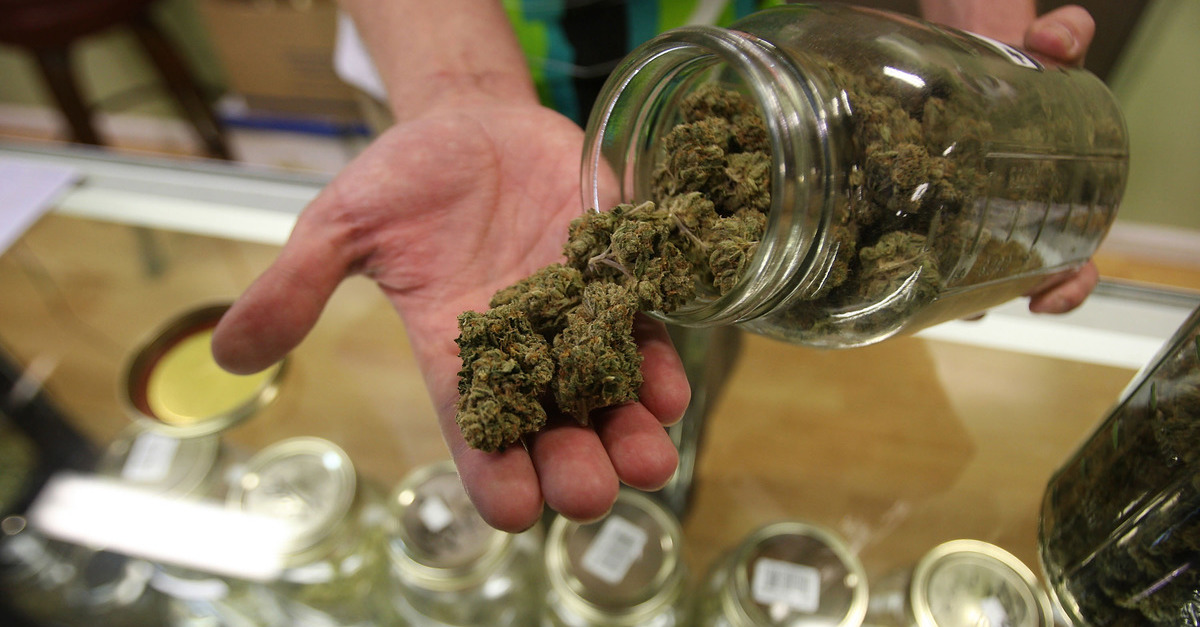
New Jersey Gov. Phil Murphy (D) signed a series of bills into law on Monday that legalize and regulate marijuana in the Garden State—clearing the way for long sought after criminal justice reform.
“As of this moment, New Jersey’s broken and indefensible marijuana laws which permanently stained the records of many residents and short-circuited their futures, and which disproportionately hurt communities of color and failed the meaning of justice at every level, social or otherwise — are no more,” the governor said during a largely no-frills signing ceremony which belied the grand nature of the action taken in Trenton.
In a major defeat for the War on Drugs, New Jersey is now the 31st state to have legalized or decriminalized adult marijuana use. The suite of legislation also eliminates criminal and civil penalties for the possession of up to six ounces of marijuana for adults 21 and older.
The state licensing and retail sales provisions come by way of A21/S21 which allows the purchase, possession and sale of one ounce of marijuana. The law also provides that such sales are subject to variable state sales taxes based on the average price per ounce. Seventy-percent of such revenue will be reinvested in some of the communities most harmed by the anti-drug tactics of the past.
Under A1897, various non-commerce-and-regulation-related marijuana activities are addressed and de-penalized. In addition to the increased possession amounts of marijuana described above, adults are now allowed to possess up to 170 grams of hashish (a compressed resin made of concentrated cannabis.) Additionally, this specific bill allows for the transfer of up to one ounce of marijuana per person and reduces criminal penalties for moving or distributing more than one ounce but less than five pounds as an individual.
And, in one of the more progressive pieces of legislation addressing marijuana laws in the country, Murphy also signed A5342 into law. This bill dispenses with criminal penalties or fines for the possession or use of marijuana by those under the age of 21.
The juvenile reform measure was a particular sticking point and coup de grace for the governor, who personally lobbied for and insisted on the bill’s inclusion into the sweeping array of legislative changes. The measure passed both chambers just minutes before the other pieces of legislation took effect without the governor’s signature.
Murphy was adamant that non-adult use of marijuana be addressed and taken out of the realm of the criminal justice system entirely. Instead of facing criminal records or civil penalties, people under the age of 21 would be provided with a series of written warnings. A third offense would result in the possibility of community service. Police are also barred from searching juveniles based solely on concerns about or evidence of marijuana use.
Lawmakers previously passed the licensing regime and criminal penalties reform measures after a November 2020 plebiscite in favor of legalization. Months of wrangling among the state Senate and House ensued as decisions about regulation and penalties were hashed out and eventually agreed upon.
In the interim between that ballot measure’s passage and Monday’s landmark progressive legislation, however, police in New Jersey controversially made some 6,000 marijuana-related arrests—a statistic which had advocates fuming.
“The enactment of these laws is long overdue,” said NORML State Policies Manager Carly Wolf in a statement hailing the tidal shift. “Now, going forward, tens of thousands of otherwise law-abiding New Jerseyans will no longer be subject to arrest and a criminal record for their personal use of marijuana, and the commercial market will be regulated in a fair and inclusive manner.”
According to the decades-old pro-marijuana reform group, retail consumers might be able to take advantage of the newly-established market in as few as six months.
[image via David McNew/Getty Images]